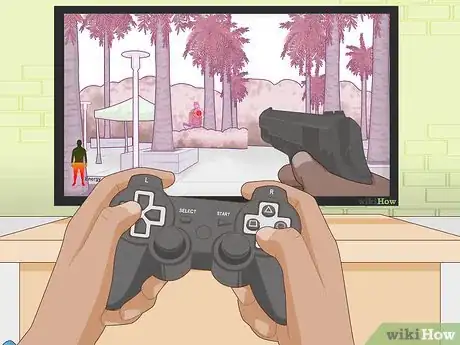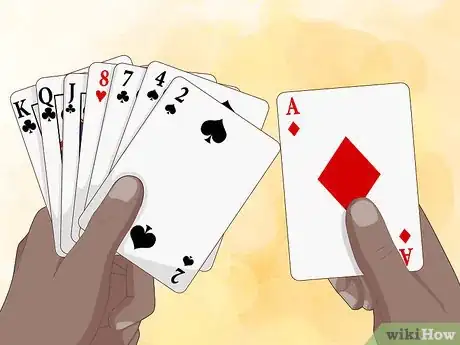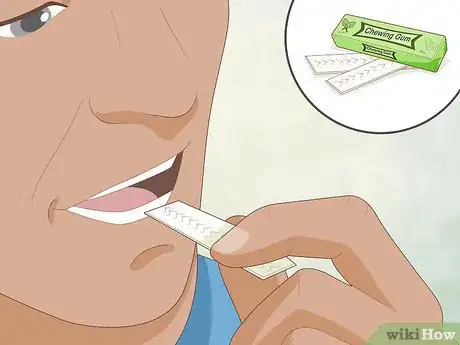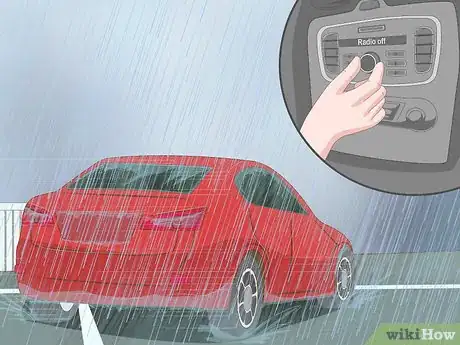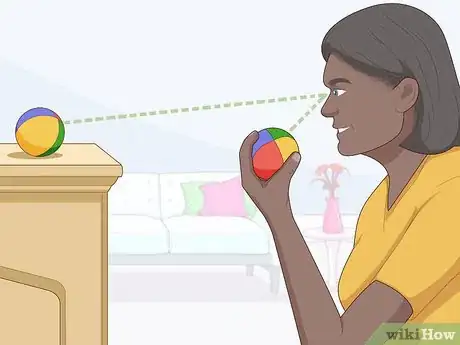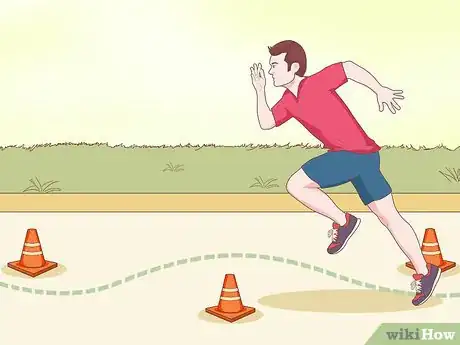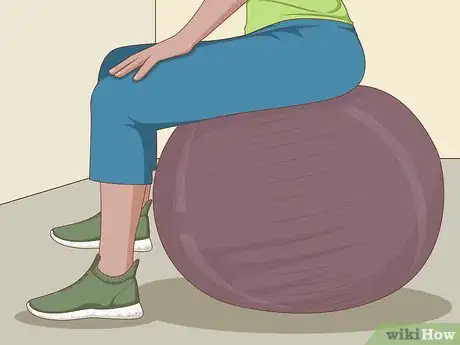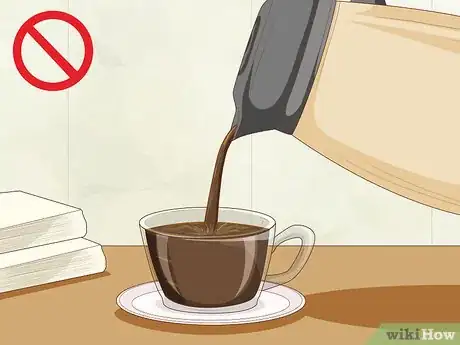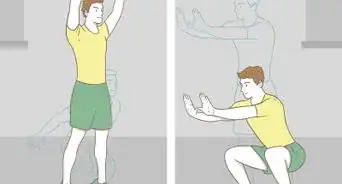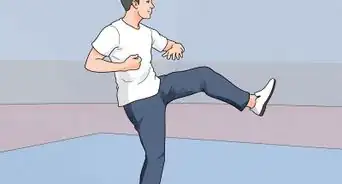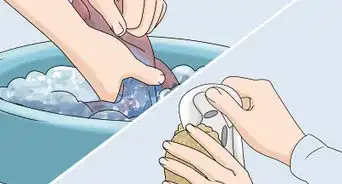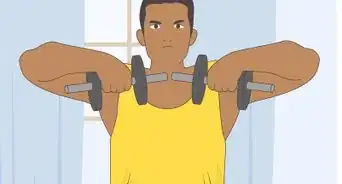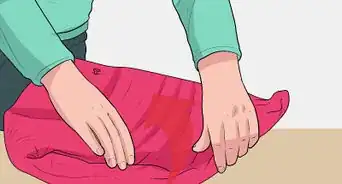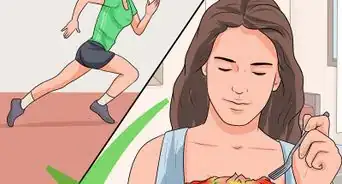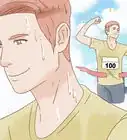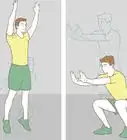This article was co-authored by Peter Fryer. Peter Fryer is a tennis writer and coach based in Derry Northern Ireland. He completed his professional teaching tennis qualification shortly after finishing university and has been teaching tennis for over 13 years. Peter began Love Tennis Blog in 2010 and contributes to the BBC and national media outlets.
There are 14 references cited in this article, which can be found at the bottom of the page.
This article has been viewed 851,326 times.
Whether you want to improve your reaction time in a competitive sport or react with superhero speed while gaming, working on your reflexes is a great habit to keep up throughout your life. It’s a fun one, too: you can start by just playing brain and video games for mental flexibility, then move on to working your body with ball and agility drills. You can even work with a sports specialist to create a particular training regimen. Get ready to start impressing friends, family and yourself with your cat-like reflexes!
Steps
Expert Q&A
Did you know you can get expert answers for this article?
Unlock expert answers by supporting wikiHow
-
QuestionHow can I improve my reaction speed in tennis?
 Peter FryerPeter Fryer is a tennis writer and coach based in Derry Northern Ireland. He completed his professional teaching tennis qualification shortly after finishing university and has been teaching tennis for over 13 years. Peter began Love Tennis Blog in 2010 and contributes to the BBC and national media outlets.
Peter FryerPeter Fryer is a tennis writer and coach based in Derry Northern Ireland. He completed his professional teaching tennis qualification shortly after finishing university and has been teaching tennis for over 13 years. Peter began Love Tennis Blog in 2010 and contributes to the BBC and national media outlets.
Sports Coach Tennis movement is all about the first few steps and being as explosive as possible to get to the ball. This requires a good ready position. Rest on the balls of your feet, not your heels, for every ball, and get back into the ready position once your shot is complete. This sets you up to make fast movements and change direction very quickly. You can improve your footwork using ladder drills. If you don't have a ladder, you can create one. Use empty bottles or any household item that you can get your hands on. Work on fast movement of the legs, but remember to keep your head up.
Tennis movement is all about the first few steps and being as explosive as possible to get to the ball. This requires a good ready position. Rest on the balls of your feet, not your heels, for every ball, and get back into the ready position once your shot is complete. This sets you up to make fast movements and change direction very quickly. You can improve your footwork using ladder drills. If you don't have a ladder, you can create one. Use empty bottles or any household item that you can get your hands on. Work on fast movement of the legs, but remember to keep your head up. -
QuestionCan you practice listening to sounds to speed up your reactions?
 Michele DolanMichele Dolan is a BCRPA certified Personal Trainer in British Columbia. She has been a personal trainer and fitness instructor since 2002.
Michele DolanMichele Dolan is a BCRPA certified Personal Trainer in British Columbia. She has been a personal trainer and fitness instructor since 2002.
Certified Fitness Trainer Listening to sounds may help you improve your reaction speed if you perform some kind of movement or activity when you hear a specific sound. For instance, kick or throw a ball up against a wall and catch it every time you hear a certain sound, or snap your fingers when you hear a car horn, or jump in the air or click your heels when you hear a bird chirp. Listening by itself may improve your concentration and focus, but not your reactions.
Listening to sounds may help you improve your reaction speed if you perform some kind of movement or activity when you hear a specific sound. For instance, kick or throw a ball up against a wall and catch it every time you hear a certain sound, or snap your fingers when you hear a car horn, or jump in the air or click your heels when you hear a bird chirp. Listening by itself may improve your concentration and focus, but not your reactions. -
QuestionHow can I enhance my hand/eye coordination?
 Community AnswerYou can practice ball games, such as tennis. Or, you could get a partner and pass a ball between the two of you, increasing or decreasing speed and experimenting with new angles. If you are currently involved in a sport, ask your coach for any tips as well. Make sure to take care of your body by eating right, working out, and sleeping enough, too.
Community AnswerYou can practice ball games, such as tennis. Or, you could get a partner and pass a ball between the two of you, increasing or decreasing speed and experimenting with new angles. If you are currently involved in a sport, ask your coach for any tips as well. Make sure to take care of your body by eating right, working out, and sleeping enough, too.
References
- ↑ http://www.futurity.org/video-games-speed-up-reaction-time/
- ↑ http://www.dailymail.co.uk/sciencetech/article-428903/How-improve-reaction-times.html#ixzz4aaUGZ9JK
- ↑ http://www.dailymail.co.uk/sciencetech/article-428903/How-improve-reaction-times.html#ixzz4aaTtrp4f
- ↑ http://www.dailymail.co.uk/sciencetech/article-428903/How-improve-reaction-times.html#ixzz4aaU7k7Gx
- ↑ https://breakingmuscle.com/learn/what-determines-reaction-time-and-how-to-improve-it
- ↑ https://www.outsideonline.com/1959876/4-easy-drills-improve-hand-eye-coordination
- ↑ https://www.outsideonline.com/1959876/4-easy-drills-improve-hand-eye-coordination
- ↑ http://www.dailymail.co.uk/sciencetech/article-428903/How-improve-reaction-times.html#ixzz4aaTW4AzF
- ↑ http://www.active.com/softball/articles/how-to-improve-your-catcher-s-reaction-time-878388
- ↑ Peter Fryer. Tennis Coach. Expert Interview. 5 July 2019.
- ↑ https://www.outsideonline.com/1959876/4-easy-drills-improve-hand-eye-coordination
- ↑ Peter Fryer. Tennis Coach. Expert Interview. 5 July 2019.
- ↑ http://www.dailymail.co.uk/sciencetech/article-428903/How-improve-reaction-times.html#ixzz4aaTeTdWu
- ↑ http://www.menshealth.co.uk/food-nutrition/healthy-eating/eat-spinach-eggs-to-boost-reaction-time
- ↑ http://www.dailymail.co.uk/sciencetech/article-428903/How-improve-reaction-times.html#ixzz4aaU1XC6i
- ↑ http://www.livescience.com/54309-caffeine-improves-reaction-time.html
- ↑ https://www.cnet.com/news/mood-lifting-bright-light-improves-reaction-time/
About This Article
To improve physical reaction time, try practicing ball drills, agility drills, and other sport-related drills. Balancing exercises like yoga can also help! If you want to improve your mental reaction time, practice making quick decisions in your everyday life. You can also play cards, computer games, and video games to improve your mental speed. Another quick and easy way to speed up your thinking is to chew gum, which stimulates muscles and sends more blood to your brain. For more tips on improving mental speed, read on!
